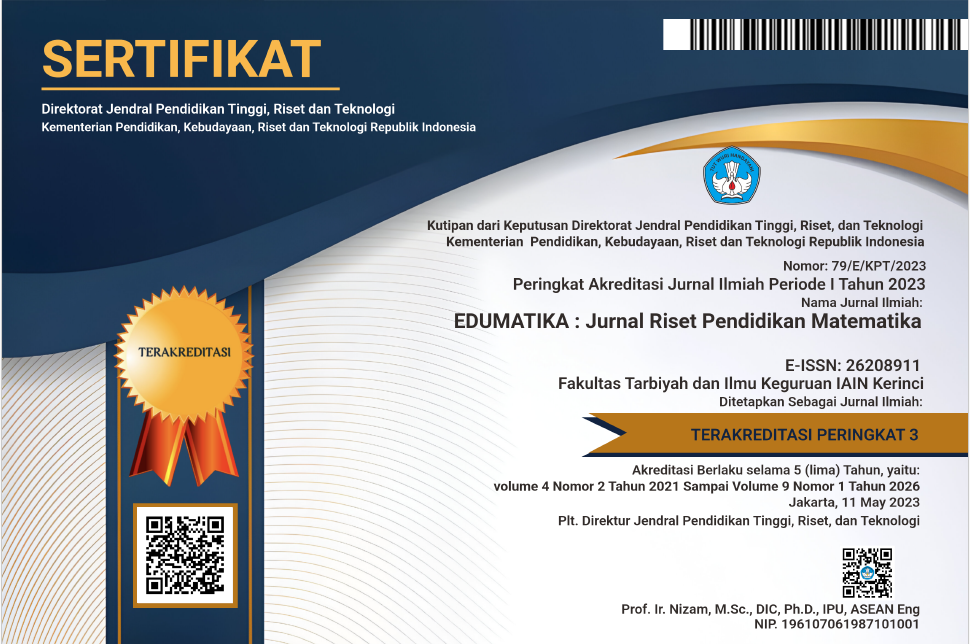The Effect of Realistic Mathematics Education Approach on Mathematical Problem Solving Ability
Abstract
Abstract. The improvement of mathematical problem-solving ability was the aim of this study through the application of the Realistic Mathematics Education approach compared to conventional learning according to the students' self-efficacy level. This study used a quasi-experimental study with a static group design conducted in eighth-grade students at SMP Negeri 1 Kerinci and SMP Negeri 5 Kerinci. Data collected through the questionnaire to determine students’ self-efficacy level and the test of students’ mathematical problem-solving abilities. The hypothesizes was tested using a t-test. The results showed that students’ mathematical problem-solving abilities who learned using the RME approach were higher than students’ abilities who learned using conventional learning. In addition, the mathematical problem-solving abilities of students who have low self-efficacy who learned using the RME approach were higher than those who learned using conventional learning.
Abstrak. Peningkatan kemampuan pemecahan masalah matematis menjadi tujuan penelitian ini melalui penerapan pendekatan Realistic Mathematics Education (RME) yang dibandingkan dengan kelas yang menerapkan pembelajaran konvensional menurut tingkat self-efficacy siswa. Penelitian ini menggunakan penelitian kuasi eksperimen dengan desain static group design yang dilaksanakan di kelas VIII pada SMP Negeri 1 Kerinci dan SMP Negeri 5 Kerinci. Data dikumpulkan melalui angket untuk menentukan tingkat self-efficacy dan tes kemampuan pemecahan masalah matematis. Hipotesis diuji dengan menggunakan uji t. Hasil penelitian menunjukkan kemampuan pemecahan masalah matematis siswa yang belajar menggunakan pendekatan RME lebih tinggi daripada siswa yang belajar menggunakan pembelajaran konvensional, dan kemampuan pemecahan masalah matematis siswa yang memiliki self-efficacy rendah yang belajar dengan menggunakan pendekatan RME lebih tinggi daripada yang belajar dengan menggunakan pembelajaran konvensional.
Downloads
References
Alifia, N. N., & Rakhmawati, I. A. (2018). Kajian Kemampuan Self-Efficacy Matematis Siswa dalam Pemecahan Masalah Matematika. Elektronik Pembelajaran Matematika, 5(1), 44–54. http://jurnal.uns.ac.id/jpm
Barnes, H. (2005). The theory of Realistic Mathematics Education as a theoretical framework for teaching low attainers in mathematics. Pythagoras, 2005(61), 42–57. https://doi.org/10.4102/pythagoras.v0i61.120
Bunga, N., Isrok’atun, & Julia. (2016). Pendekatan Realistic Mathematics Education Untuk Meningkatkan Kemampuan Koneksi dan Komunikasi Matematis Siswa. Jurnal Pena Ilmiah, 1(2), 441–450. https://doi.org/10.30870/jppm.v10i2.2043
Dewi, N. R., & Kusumah, Y. S. (2014). Developing Test of High Order Mathematical Thinking Ability in Integral Calculus Subject. International Journal of Education and Research, 2(12), 101–108.
Fauzan, A., Musdi, E., & Yani, R. (2017). The Influence of Realistic Mathematics Education (RME) Approach on Students' Mathematical Representation Ability. Advance in Social Science, Education and Humanities Research, 173, 9–12.
Fauzan, A., Slettenhaar, D., & Plomp, T. (2002, April). Traditional mathematics education vs. realistic mathematics education: Hoping for changes. In Proceedings of the 3rd International Mathematics Education and Society Conference (pp. 1-4). Copenhagen: Centre for Research in Learning Mathematics.
Lady, A., Utomo, B. T., & Lovi, C. (2018). Improving mathematical ability and student learning outcomes through realistic mathematic education (RME) approach. International Journal of Engineering and Technology(UAE), 7(2), 55–57. https://doi.org/10.14419/ijet.v7i2.10.10954
Laurens, T., Batlolona, F. A., Batlolona, J. R., & Leasa, M. (2018). How does realistic mathematics education (RME) improve students’ mathematics cognitive achievement?. Eurasia Journal of Mathematics, Science and Technology Education, 14(2), 569–578. https://doi.org/10.12973/ejmste/76959
Lubis, W. A., Ariswoyo, S., & Syahputra, E. (2020). Kemampuan Pemecahan Masalah Matematika Melalui Pendekatan Pendidikan Matematika Realistik dan Pendekatan Penemuan Terbimbing Berbantuan Autograph. Edumatika: Jurnal Riset Pendidikan Matematika, 3(1), 1. https://doi.org/10.32939/ejrpm.v3i1.483
Masitoh, L. F., & Fitriyani, H. (2018). Improving students’ mathematics self-efficacy through problem based learning. Malikussaleh Journal of Mathematics Learning (MJML), 1(1), 26. https://doi.org/10.29103/mjml.v1i1.679
Masri, M. F., Suyono, S., & Deniyanti, P. (2018). Pengaruh Metode Pembelajaran Berbasis Masalah Terhadap Self-Efficacy Dan Kemampuan Pemecahan Masalah Matematis Ditinjau dari Kemampuan Awal Matematika Siswa SMA. Jurnal Penelitian Dan Pembelajaran Matematika, 11(1). https://doi.org/10.30870/jppm.v11i1.2990
Mulyati, A. (2017). Pengaruh Pendekatan RME terhadap Kemampuan Pemecahan Masalah Siswa pada Materi Operasi Hitung Campuran di Kelas IV SD IT Adzkia I Padang. Jurnal Didaktik Matematika, 4(1), 90–97. https://doi.org/10.24815/jdm.v4i1.8484
Nurkaeti, N. (2018). Polya’S Strategy: an Analysis of Mathematical Problem Solving Difficulty in 5Th Grade Elementary School. EduHumaniora | Jurnal Pendidikan Dasar Kampus Cibiru, 10(2), 140. https://doi.org/10.17509/eh.v10i2.10868
Nursiddik, I., Noto, M. S., & Hartono, W. (2017). Pengaruh Pembelajaran Matematika Realistik Terhadap Kemampuan Pemahaman Matematis dan Keyakinan Diri Siswa SMP. UNION: Jurnal Ilmiah Pendidikan Matematika, 5(2), 151–160. https://doi.org/10.30738/.v5i2.1085
Susanti, S. (2017). Meningkatkan Kemampuan Pemecahan Masalah Matematis dan Self-Efficacy Siswa MTs Melalui Pendekatan Pendidikan Matematika Realistik. Suska Journal of Mathematics Education, 3(2), 92. https://doi.org/10.24014/sjme.v3i2.4148
Tambunan, H. (2019). The Effectiveness of the Problem Solving Strategy and the Scientific Approach to Students’ Mathematical Capabilities in High Order Thinking Skills. International Electronic Journal of Mathematics Education, 14(2), 293–302. https://doi.org/10.29333/iejme/5715
Ulya, R., & Hidayah, I. (2016). Kemampuan Pemecahan Masalah Ditinjau dari Self-Efficacy Siswa dalam Model Pembelajaran Missouri Mathematics Project. UJMER Unnes Journal of Mathematics Education Research, 5(2), 178–183. http://journal.unnes.ac.id/sju/index.php/ujmer
Wilde, N., & Hsu, A. (2019). The influence of general self-efficacy on the interpretation of vicarious experience information within online learning. International Journal of Educational Technology in Higher Education, 16(1). https://doi.org/10.1186/s41239-019-0158-x
Yusuf, M. (2011). The impact of self-efficacy, achievement motivation, and self-regulated learning strategies on students’ academic achievement. Procedia - Social and Behavioral Sciences, 15, 2623–2626. https://doi.org/10.1016/j.sbspro.2011.04.158















